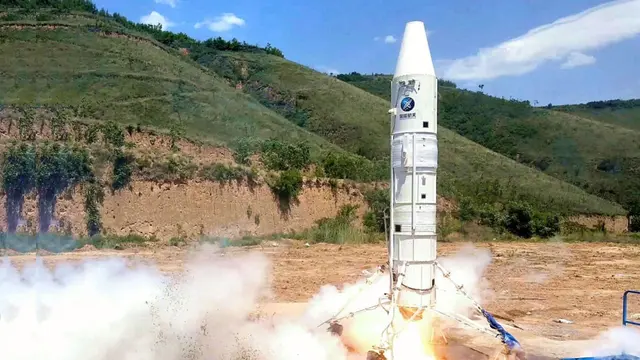China’s private rocket company, Deep Blue Aerospace, faced a setback on Sunday when its reusable Nebula-1 rocket crashed during a high-altitude recovery test.
Despite meeting 10 of 11 goals in the vertical takeoff and landing trial, the rocket failed in the final landing phase.

The Nebula-1, a two-stage rocket with a diameter of 3.35 meters, runs on a combination of kerosene and liquid oxygen.
The first stage is equipped with nine 3D-printed, variable thrust Thunder-R1 engines, while the second stage relies on a single engine.
This configuration enables the rocket to carry up to 2,000 kilograms to low Earth orbit (LEO), with future enhancements aiming to increase this capacity to 8,000 kilograms.
The test flight began smoothly, with the rocket’s three engines firing as expected and propelling it to a high altitude.
The descent started well, with two engines shutting down as planned. However, when attempting to land back at the designated pad, the landing mechanism malfunctioned.
As a result, the Nebula-1 made a hard landing, causing its upper section to break and sustain fire damage.
Earlier this year, Deep Blue Aerospace secured significant funding through B and B1 rounds, amounting to hundreds of millions of yuan (equivalent to tens of millions of dollars).
This funding was intended to bolster its reusable rocket program, which includes the ambitious Nebula-1 project and a more powerful Nebula-2 rocket designed to transport 20,000 kilograms to LEO.
Despite the crash, the company remains committed to advancing its technology.
The Nebula-1’s test flight was expected to demonstrate China’s first controlled landing of an orbital rocket’s first stage, using retropropulsion and landing legs.
Although this goal wasn’t fully achieved, the team is currently reviewing data from the recent tests to identify the cause of the malfunction.
The Nebula-1 program is part of a larger trend among private Chinese space companies aiming to meet the growing demand in the commercial space sector.
Many are testing different spacecraft designs and exploring alternative fuels like kerosene and methane, which could reduce costs and make launches more environmentally friendly.
This comes amid rising competition to establish satellite constellations to rival networks like Elon Musk’s Starlink.
In May 2022, Deep Blue Aerospace successfully conducted a kilometer-level launch and landing test with the Nebula-1, marking a step forward in their VTVL capabilities.
The recent crash underscores the challenges inherent in developing reusable rockets, but the ongoing efforts of Deep Blue Aerospace and other private companies signify a rapidly evolving landscape in China’s space industry.
